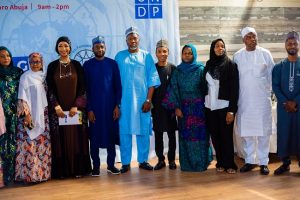As part of its advocacy to close the knowledge gap about the level of talent in northern Nigeria’s innovation ecosystem, the Northern Ecosystem Working Group (NEW-G), a body established to foster a sustainable, inclusive, and forward-thinking environment, has called for increased collaboration to accelerate growth in the region.

Despite its reputation as a hotbed of innovators, creatives, entrepreneurs, and other successful ventures, northern Nigeria remains lowly ranked in the innovation landscape. This is a depressing situation for which the group provided multiple explanations, citing several surveys and discussions that pointed to general issues that, if resolved, could significantly improve the region’s ecosystem’s status.
Jamila Aliyu Mohammed, the head of experimentation and public sector innovation at the United Nations Development Programme (UNDP), says that, to address some of the complex development challenges that have caused the region’s setbacks and to enable it to realise the targets of the Sustainable Development Goals (SDGs), new methodologies and approaches must be developed urgently.
Speaking on Tuesday, February 13, 2024, in Abuja, during a stakeholders’ engagement meeting organised by the NEW-G with support from the UNDP, Mohammed highlighted that one of the solutions to the crisis is to put the region on the map so it can gain the necessary visibility, which she believed would lead to a frontier challenge that could help the region attract funding and investment to the ecosystem.
According to her, this need prompted the NEW-G’s Ecosystem Mapping Project (EMP), which was carried out to accurately chart and analyse northern Nigeria’s innovation terrain.
She continued by clarifying that this all-encompassing strategy is expected to spur improved knowledge, collaboration, and focused action, ultimately contributing to the development and growth of the region’s robust, interconnected, and dynamic innovation ecosystem.
“If I had a magic wand, I would wave it and have everyone work together,” she said, because right now “we are working in silos,” which allows falling into the same trap of repeating and recreating the same thing over and over again.
As a result, she believes that bringing the stakeholders together in a single space will foster a shared understanding among the diverse industry players and lead to a collective solution to the problem.
Elaborating more about the purpose of the gathering, Musa Ali Baba, the coordinator of NEW-G, hinted that his group had brought the participants together to make sure the innovation ecosystem in the northern region of the country is elevated to a certain degree of prominence and to highlight the accomplishments that have already been made.
This, according to him, is because change starts with conversations, and the reason for the forum is to ensure that private conversations become public conversations to bring people and ideas together.
“We don’t pretend to have answers to everything; what we are doing is creating a platform for that to happen,” Ali Baba said.
However, the NEW-G has created a data platform to gather information that helps bring reputation to both the opportunities and issues that require urgent attention going forward.
“That starts with the conversation,” and then “we move on to the collaboration,” to address some of the region’s challenges, such as infrastructure and capacity development, said the group’s chieftain.
Data, he believes, will drive and foster the projected collaboration because the NEW-G is already collaborating with investors and entrepreneurs to create incentives for individuals.
Like the previous speaker, Ali Baba exhorted stakeholders to move beyond working in silos and collaborate since inclusivity is critical to the movement’s success.
“Everybody must work together, and we hope that the academic institutions are part of this because this is not anybody’s agenda; the 19 states are equally part of this project,” he argued.
According to Kashifu Abdullahi, director-general of the National Information Technology Development Agency (NITDA), for any type of change to occur, there must first be a sense of urgency, which is exactly what the NEW-G has done by bringing various sectorial actors together and emphasising the importance of acting quickly to protect the northern ecosystem.
The NITDA boss stated that by creating a feeling of urgency, people will understand that there is an ecosystem in the north with potential issues that require answers.
“And people will start asking, how can we solve the problem and strengthen the ecosystem?” Abdullahi added to explain how stakeholder discussions and engagement can help open the door for the expected change.
By Etta Michael Bisong, Abuja
